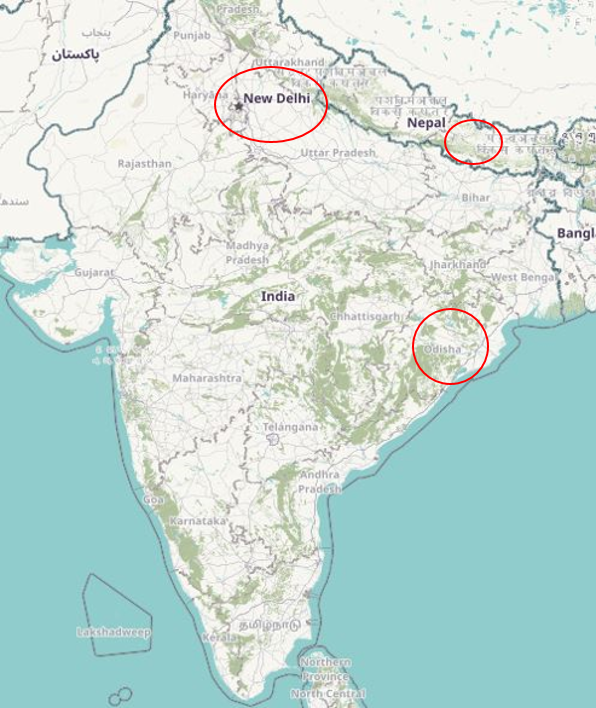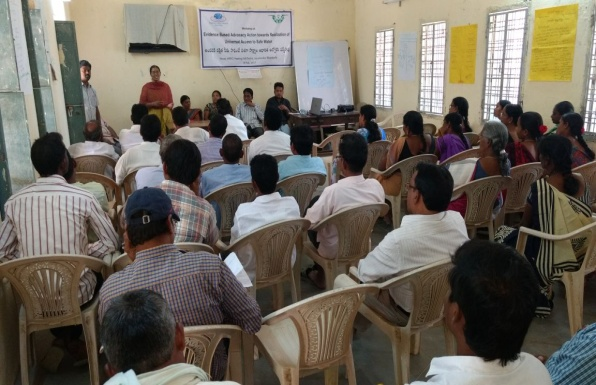Executive Summary
This case study supports and illustrates the theoretic factsheet "Human right to water" with practical insights.
Integration of the Human Right to Water and Sanitation Principles in the business strategy of private water businesses and the application of HRWS business guidelines checklist
For the realisation of the human right to water also private enterprises have a key role to play: The United Nations Human Rights Council (2011) endorsed the Guiding Principles on Business and Human Rights which apply to all states and to all enterprises. Antenna Foundation, WaterLex and the Freshwater Action Network South Asia (FANSA) partnered to ensure compliance of the businesses (partners of the Safe Water Programme Phase II: TARA, Delhi; Spring Health, Odisha, India; Water and Sanitation Users’ Committees and ECCA, Kathmandu, Nepal, (please compare map)) to Human Rights to Water and Sanitation.

WaterLex developed a checklist for use by these water enterprises to self-assess their business’ compliance to the human right to water, which was presented to them in a workshop organised by FANSA national chapters in respective countries.

The aim of the workshops was to build business partners’ and civil societies’ understanding of international perspective of Human Right to Water and Sanitation (HRWS), SDG framework and water quality issues at community and state level. FANSA facilitated self-assessment by individual partner on compliance to HRWS. Some of the gaps observed included lack of community participation, lack of action on chemical contamination, lack of sustainability plans, and lack of strategy on inclusion of most vulnerable communities. The partners were encouraged to prioritise areas they felt they would be able to take action on immediately and develop action plans for these areas. FANSA is supporting the partners in areas where advocacy with the state is required (such as ensuring availability of water at source and measures to reduce chemical contamination). Integrating these guidance principles on business and human rights (such as affordability, availability, accessibility, participation, non-discrimination and sustainability) in a business strategy over a period of time will have a substantial impact on worker’s lives. It will lead to positive impact on health, environment and economy of individuals, communities and states. Moreover, it will help increase uptake of the business by users as well as bring increased satisfaction and motivation to the business.
Challenges and lessons learnt from FANSA and WaterLex implementing the HRWS business guidelines
Main challenges of implementing Human Right to Water and Sanitation Principles (HRWS)
- In absence of any state regulations, motivating enterprises to change their business strategy to make it compliant with HRWS is a challenge. It is equally challenging to implement the tool with government-owned water supply bodies as no leverage is in place and compliance works on a voluntary level.
- Small-scale businesses may not have the capacity to invest time and resources required for the process to adapt the HRWS business guidelines to their respective business, which implies external support of an entity like FANSA.
- The fact that the HRWS business guideline checklist was initially in English, made it difficult for partners to implement in their day-to-day business due to diverse languages prevalent in their area of work. The checklist had to be translated in regional languages.
- Different implementers did perceive the third part of the HRWS business guidelines checklist, which assesses decision-making processes of the enterprise from the angle of a human rights perspective as interfering with the independence of the enterprise’s internal policies.
Lessons learnt of implementing the HRWS business guidelines
Allocate responsibilities
In order to implement the HRWS business guidelines in practice it is crucial to first create an understanding of HRWS among the businesses that are implementing the guidelines. Responsibilities have to be discussed and the people convinced to comply with human rights for achieving the sustainable development goals.
Innovative features
Organising a workshop to enhance understanding of businesses’ responsibilities to comply with HRWS before carrying out self-assessment on compliance with these rights is innovative as the whole process has been newly invented and executed for the first time.
Participatory process
The process of self-assessment on compliance with each partner individually, supporting the development of an action plan for incremental implementation of guidance principles so that full realisation of human rights is achieved after a certain period of time. The checklist worked well for the business partners engaged in supplying water or household water solutions in finding the gaps on compliance to HRWS, once the process was facilitated by FANSA. Moreover, regular follow up and support is required for developing and implementing such an action plan to ensure integration of these principles in a company’s strategy.
Adapting to local circumstances and language
It is important to adapt the tool to the local language for better understanding of the principles and having appropriate responses on checklist. The tool should be implemented in two stages, with first two parts being taken up first and the third part of the tool (decision-making process in line with HRWS) should be undertaken once the water services are compliant to human rights [for details see checklist].
Long-term impact
The users of the HRWS business principles realized that water operators could contribute to the realization of human rights to water and sanitation. If the realized compliance is coherently communicated it can build trust and increased acceptance of the enterprise and its products among users as well as the state. Increased credibility and an improved social image will facilitate an increased uptake of the procedures within governments and the private sector.
Recommendations for replicating the implementation of HRWS business guidelines checklist
- It is very important to sensitise the business partners on their obligations to human rights to water and sanitation before introducing the tool.
- Although the checklist is a self-assessment tool, it is important to provide handholding support to the water entrepreneurs in developing time-bound plans for honest self-reflection and implementation of the actions to achieve compliance to HRWS principles.
- Civil society organisations (CSO) should advocate with the Government to make both the state and private water suppliers implement the checklist, thus promoting the achievement of sustainable development goal 6.1. In addition it is recommended that CSO support the water suppliers in self-assessment and compliance to Human Rights to water and sanitation.
Guiding Principles on Business and Human Rights
Pricing of Water and the Human Right to Water
Protect, Respect and Remedy: a Framework for Business and Human Rights
The Human Right to Water and Sanitation
Freshwater Action Network South Asia (FANSA)
Freshwater Action Network South Asia (FANSA) aims to strengthen the engagement of CSOs in policy-making and development initiatives to achieve the international targets on water and sanitation, improve regional co-operation between CSOs of differing perspectives, priorities and skills and increase the number of NGOs to advocate and communicate clearly on water policy issues and the broader agenda.


